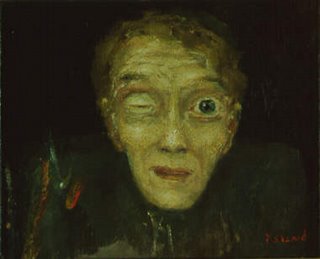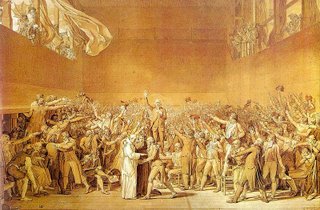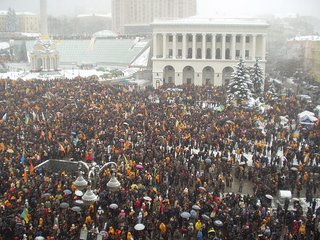Dealing with the economy, or how to counter the shift to a paradigm blind
article in response to B. Duguay, following his two articles:
New Order political decrypt, explore the thought economist
http://www.agoravox.fr/tb_receive.php3?id_article=14902/
new political order (II), exceed economism
http://www.agoravox.fr/tb_receive.php3?id_article=15014/
Mr. B. Duguay, I read carefully your two tickets. Very good articles as always. So
lides, documented, and provocative. Let me send you my reactions to them, which among other things on my observations of speeches on Agoravox.
You criticize a new doctrine, the economy (it would be more accurate to refer to as Marchéisme belief that the only source of regulation is just the market), as devoid of ideology. I would first like to clarify that with regard to economic thinking horizon is posed: is the consumer welfare (1) and the concern of the optimal allocation of wealth. These criteria have been taken since the first liberals to the neo chicagoïens. Therefore, given the importance of "public interest" for A. Smith, until the cardinal principle of "efficiency" under Reagan, and taking into account the fact that historically the relationship between men is a relationship of domination (2), I draw some conclusions personal :
1 Economy main concern of our policy is not ipso facto devoid of ideology.
2 The dilution of our ideological rhetoric is actually substituting rhetoric figures.
3 The inability to assess certain contributions to society such as the elevation of the critical spirit of its citizens (which allows for better governance by the people) can fall by the wayside these considerations (to quote Forest Ent: "It is normal that the economy follows the rules of the economy. It is unusual that a company not follow the rules of the economy. "). However, only the economic evaluation criteria (that is to say, the national accounts) is advanced.
3 The inability to assess the quality of consumption, but its only valid on quantifiable value shift toward a model criticism (average lifespan of products in free fall, but rising consumption so positive assessment of the phenomenon).
More generally unable to assess the externalities (the "snowball effect" in particular) both positive and negative way, is a decisive criticism made against economism.
4 The greatest concern is not the disappearance of ideology, but the paradigm shift: it no longer seeks to rely on an ideology, a goal, a vision, but only its compliance with economic concerns, as if there was no truth outside of his numbers (3). The word "politics" has become taboo, or rather 'productive cons. 5 Finally, it is amusing to see that after having freed the need to be justified by a transcendent goal, economy itself becomes a language of domination used to stigmatize (in the sociological sense) the successes and failures, to practice eugenics by the physical elimination of stigma and poor media (media company in Russia) to above the law propel some individuals (Justice at three speeds described by a recent report by the UMP), thereby restoring the privileges abolished, to destroy the state by dumping (social tax) and interstate competition in intensify inequalities and curb social mobility (the lowest in Europe at 27), and highlight of the show to destroy democracy by weakening the government through its finances and its laws (4).
5 Finally, it is amusing to see that after having freed the need to be justified by a transcendent goal, economy itself becomes a language of domination used to stigmatize (in the sociological sense) the successes and failures, to practice eugenics by the physical elimination of stigma and poor media (media company in Russia) to above the law propel some individuals (Justice at three speeds described by a recent report by the UMP), thereby restoring the privileges abolished, to destroy the state by dumping (social tax) and interstate competition in intensify inequalities and curb social mobility (the lowest in Europe at 27), and highlight of the show to destroy democracy by weakening the government through its finances and its laws (4).
Therefore, the two horizons must necessarily be ignored: the consumer welfare (5) and the concern of the optimal allocation of wealth. That's when a new rhetoric that takes over: Darwinism (6), fatalism, economism (7), cynicism (8).
What remains? The impression that it was the enslaved themselves, who will justify their enslavement. Therefore, do not expect a reaction from citizens, who must overcome before the right- Media will release its willingness to be submitted.
Do not we doing ourselves a grave mistake by attacking the savings on its strongest point, namely its lack of ideology? It seems instead that the quality of teaching is clear, and so the Economist is open to criticism that may well be more effective and would deal violated its own principles ie meritocracy (s social mobility ' collapse, particularly France), free enterprise (banks are not lending, the law has become too complex to be run), free competition (opacity Legal and tax that benefits only large corporations, cartels, agreements and prices up, including abuse of economic power distributors against producers and consumers), the consumer welfare (non-interoperable equipment, defective by design) The proper allocation of resources (waste: FAO said, our current production can feed 12 billion people), control of externalities (pollution, stress, stupor, acculturation).
It seems to me, Mr. Duguay, believing that the Economist devoid of ideology, we would fall into the trap that you yourself have pointed "The citizen scientist as he thinks he is an ignorant formatted by an authority outside the discourse that has nothing to do with his release".
discourse has changed, and it is more ideological, certainly. The form "apolitical" This doctrine is of course an illusion to deceive the scalded cats.
In 1984, G. Orwell describes a ruling class who accepts his own irrepressible desire for power, as the end and means of action. We're not there yet, but we slip, as shown by the speech observed in the mouths of supporters of the Economy.
Because today's economy is actually dehumanized in its original considerations as detached and humanistic concerns himself vector of cynicism (and therefore the economy is dehumanizing). The urgency seems to be "rehumanize" throughout the speech. Attacking the economy on its ideological betrayals would therefore kill two birds with one stone: to move the debate on values and consistency, and denounce the eye burst of Economy (thus raising the priority with the consumers and the misallocation of resources).
is the role of the citizen. The politician is too busy doing "pedagogy" called by Eric Le Boucher, to confuse the model for the benefit of his handful of supporters, and to ensure (more difficult) social peace in a world where remnants ideological factions are still alive (nationalist, racist, religious fundamentalists, anarchists, communists, gangsters and so on of the best). He forgets, however, although its role is reduced to a trickle, to invent new missions as useless qu'onéreuses.
humbly hope that my article feed your thoughts.
Sincerely, Johan
(1) Concept used in Competition Law to mean the freedom of choice, low prices and quality products.
(2) Who took the rhetorical justifications through the language and legal and physical embodiments.
(3) (IP: xxx.x75.37.70), which is probably Adolphos, often said that economics is a Science. It should add a science "human" and therefore eminently fallible, and imbued with reading the world of his time.
(4) Deregulation tends to anarchy and the law of the jungle, even as we speak of "market regulation". The market produces a form of regulation that complements that of the state, and the quality of his work depends on the regulation prior state.
(5) The freedom of choice, low prices and quality products
(6) And yet, in the best case! : Neo liberals overlook the importance of meritocracy in Darwinism "political."
(7) The rules of economics are then justified in their own existence: if you do not relocating to China, others will and we will compete.
(8) People are overwhelmed by greed and do not assess more than just the difficulties in reaching the goal, as players of lotto or crack dealers described in "Freakonomics."
http://www.agoravox.fr/tb_receive.php3?id_article=15191
lides, documented, and provocative. Let me send you my reactions to them, which among other things on my observations of speeches on Agoravox.
You criticize a new doctrine, the economy (it would be more accurate to refer to as Marchéisme belief that the only source of regulation is just the market), as devoid of ideology. I would first like to clarify that with regard to economic thinking horizon is posed: is the consumer welfare (1) and the concern of the optimal allocation of wealth. These criteria have been taken since the first liberals to the neo chicagoïens. Therefore, given the importance of "public interest" for A. Smith, until the cardinal principle of "efficiency" under Reagan, and taking into account the fact that historically the relationship between men is a relationship of domination (2), I draw some conclusions personal :
1 Economy main concern of our policy is not ipso facto devoid of ideology.
2 The dilution of our ideological rhetoric is actually substituting rhetoric figures.
3 The inability to assess certain contributions to society such as the elevation of the critical spirit of its citizens (which allows for better governance by the people) can fall by the wayside these considerations (to quote Forest Ent: "It is normal that the economy follows the rules of the economy. It is unusual that a company not follow the rules of the economy. "). However, only the economic evaluation criteria (that is to say, the national accounts) is advanced.
3 The inability to assess the quality of consumption, but its only valid on quantifiable value shift toward a model criticism (average lifespan of products in free fall, but rising consumption so positive assessment of the phenomenon).
More generally unable to assess the externalities (the "snowball effect" in particular) both positive and negative way, is a decisive criticism made against economism.
4 The greatest concern is not the disappearance of ideology, but the paradigm shift: it no longer seeks to rely on an ideology, a goal, a vision, but only its compliance with economic concerns, as if there was no truth outside of his numbers (3). The word "politics" has become taboo, or rather 'productive cons.
 5 Finally, it is amusing to see that after having freed the need to be justified by a transcendent goal, economy itself becomes a language of domination used to stigmatize (in the sociological sense) the successes and failures, to practice eugenics by the physical elimination of stigma and poor media (media company in Russia) to above the law propel some individuals (Justice at three speeds described by a recent report by the UMP), thereby restoring the privileges abolished, to destroy the state by dumping (social tax) and interstate competition in intensify inequalities and curb social mobility (the lowest in Europe at 27), and highlight of the show to destroy democracy by weakening the government through its finances and its laws (4).
5 Finally, it is amusing to see that after having freed the need to be justified by a transcendent goal, economy itself becomes a language of domination used to stigmatize (in the sociological sense) the successes and failures, to practice eugenics by the physical elimination of stigma and poor media (media company in Russia) to above the law propel some individuals (Justice at three speeds described by a recent report by the UMP), thereby restoring the privileges abolished, to destroy the state by dumping (social tax) and interstate competition in intensify inequalities and curb social mobility (the lowest in Europe at 27), and highlight of the show to destroy democracy by weakening the government through its finances and its laws (4). Therefore, the two horizons must necessarily be ignored: the consumer welfare (5) and the concern of the optimal allocation of wealth. That's when a new rhetoric that takes over: Darwinism (6), fatalism, economism (7), cynicism (8).
What remains? The impression that it was the enslaved themselves, who will justify their enslavement. Therefore, do not expect a reaction from citizens, who must overcome before the right- Media will release its willingness to be submitted.
Do not we doing ourselves a grave mistake by attacking the savings on its strongest point, namely its lack of ideology? It seems instead that the quality of teaching is clear, and so the Economist is open to criticism that may well be more effective and would deal violated its own principles ie meritocracy (s social mobility ' collapse, particularly France), free enterprise (banks are not lending, the law has become too complex to be run), free competition (opacity Legal and tax that benefits only large corporations, cartels, agreements and prices up, including abuse of economic power distributors against producers and consumers), the consumer welfare (non-interoperable equipment, defective by design) The proper allocation of resources (waste: FAO said, our current production can feed 12 billion people), control of externalities (pollution, stress, stupor, acculturation).
It seems to me, Mr. Duguay, believing that the Economist devoid of ideology, we would fall into the trap that you yourself have pointed "The citizen scientist as he thinks he is an ignorant formatted by an authority outside the discourse that has nothing to do with his release".
discourse has changed, and it is more ideological, certainly. The form "apolitical" This doctrine is of course an illusion to deceive the scalded cats.
In 1984, G. Orwell describes a ruling class who accepts his own irrepressible desire for power, as the end and means of action. We're not there yet, but we slip, as shown by the speech observed in the mouths of supporters of the Economy.
Because today's economy is actually dehumanized in its original considerations as detached and humanistic concerns himself vector of cynicism (and therefore the economy is dehumanizing). The urgency seems to be "rehumanize" throughout the speech. Attacking the economy on its ideological betrayals would therefore kill two birds with one stone: to move the debate on values and consistency, and denounce the eye burst of Economy (thus raising the priority with the consumers and the misallocation of resources).
is the role of the citizen. The politician is too busy doing "pedagogy" called by Eric Le Boucher, to confuse the model for the benefit of his handful of supporters, and to ensure (more difficult) social peace in a world where remnants ideological factions are still alive (nationalist, racist, religious fundamentalists, anarchists, communists, gangsters and so on of the best). He forgets, however, although its role is reduced to a trickle, to invent new missions as useless qu'onéreuses.
humbly hope that my article feed your thoughts.
Sincerely, Johan
(1) Concept used in Competition Law to mean the freedom of choice, low prices and quality products.
(2) Who took the rhetorical justifications through the language and legal and physical embodiments.
(3) (IP: xxx.x75.37.70), which is probably Adolphos, often said that economics is a Science. It should add a science "human" and therefore eminently fallible, and imbued with reading the world of his time.
(4) Deregulation tends to anarchy and the law of the jungle, even as we speak of "market regulation". The market produces a form of regulation that complements that of the state, and the quality of his work depends on the regulation prior state.
(5) The freedom of choice, low prices and quality products
(6) And yet, in the best case! : Neo liberals overlook the importance of meritocracy in Darwinism "political."
(7) The rules of economics are then justified in their own existence: if you do not relocating to China, others will and we will compete.
(8) People are overwhelmed by greed and do not assess more than just the difficulties in reaching the goal, as players of lotto or crack dealers described in "Freakonomics."
http://www.agoravox.fr/tb_receive.php3?id_article=15191

 the same director: Night and Fog (1955), Hiroshima mon amour (1959), Life is a novel (1983), Same Old Song (1997), Pas sur la bouche (2003).
the same director: Night and Fog (1955), Hiroshima mon amour (1959), Life is a novel (1983), Same Old Song (1997), Pas sur la bouche (2003). 



 The logic of fair trade and other development products competed sustainable is the logic called "reverse die (in the words of JK Galbraith in The New Industrial State). For most products, the label existed prior to production. For many, it is perfectly understandable given the specifications (eg footballs without child labor). The choice to do a fair trade coffee as "Just coffee" Consumers International is an ideological choice, and it is a criterion that the ideological consumer will perceive the label as a selling point. The consumer is forced to choose between a fair trade coffee or not. But if he chooses to put a coffee Malongo, he will be forced to take fair (Max Havelaar in this case).
The logic of fair trade and other development products competed sustainable is the logic called "reverse die (in the words of JK Galbraith in The New Industrial State). For most products, the label existed prior to production. For many, it is perfectly understandable given the specifications (eg footballs without child labor). The choice to do a fair trade coffee as "Just coffee" Consumers International is an ideological choice, and it is a criterion that the ideological consumer will perceive the label as a selling point. The consumer is forced to choose between a fair trade coffee or not. But if he chooses to put a coffee Malongo, he will be forced to take fair (Max Havelaar in this case). 
 2 The difficulty in identifying the worker and to deliver aid. This would require the assistance of producer, which traces its products anyway. Or resign themselves to help "blind" that is to say, more or less arbitrarily.
2 The difficulty in identifying the worker and to deliver aid. This would require the assistance of producer, which traces its products anyway. Or resign themselves to help "blind" that is to say, more or less arbitrarily. 
 some dictatorships in Asia are just as draconian but their patriotism, social cohesion and discipline culturally rooted cause some economic prosperity that benefit few but certainly not objectionable. Other leaders would not sacrifice for anything if their factory state, for fear of capital flight.
some dictatorships in Asia are just as draconian but their patriotism, social cohesion and discipline culturally rooted cause some economic prosperity that benefit few but certainly not objectionable. Other leaders would not sacrifice for anything if their factory state, for fear of capital flight. 